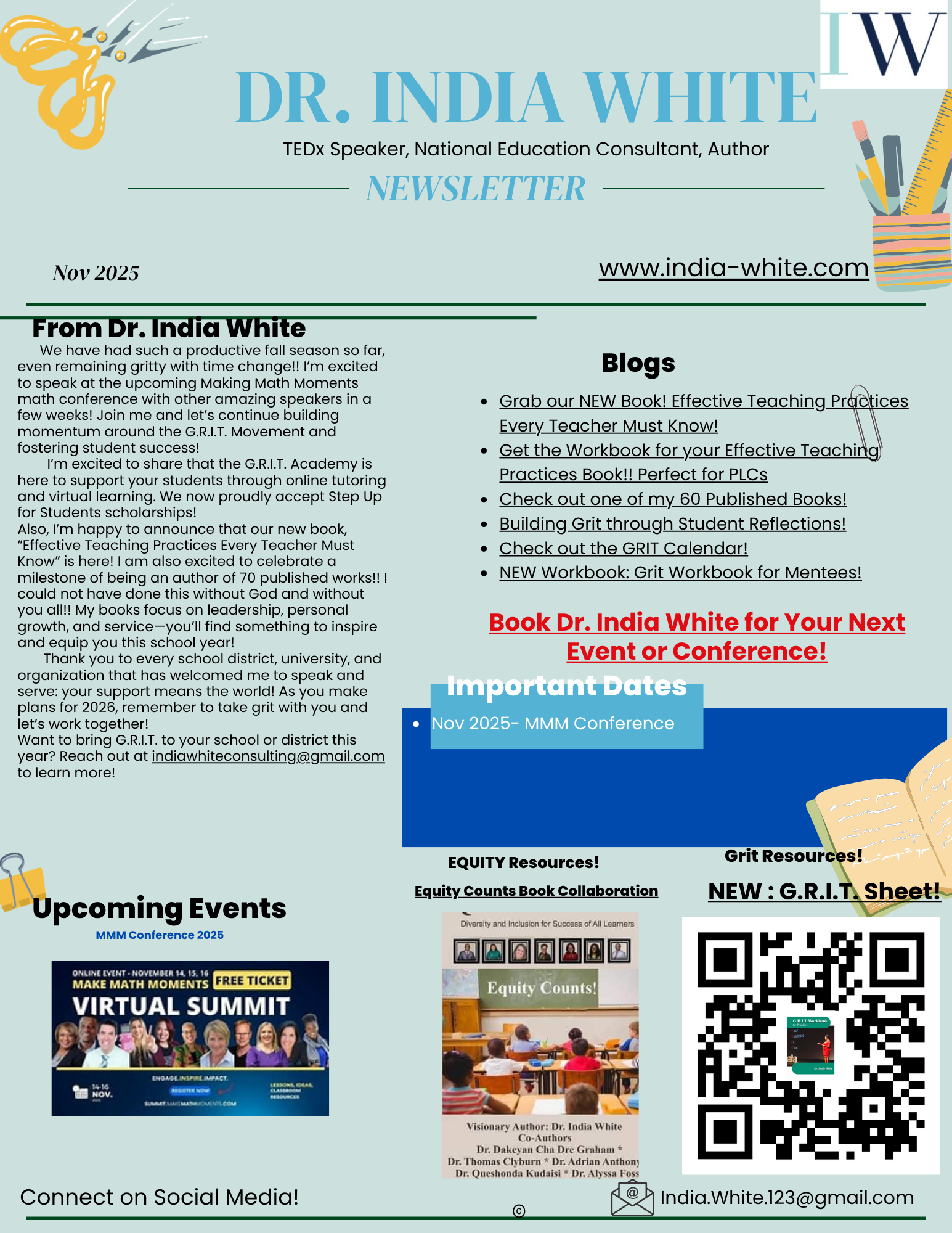By India White
•
October 24, 2025
# The Power of Grit in Mentoring: A Leader’s Playbook for Building Perseverance, Confidence, and Achievement Mentoring changes lives when it moves beyond encouragement and becomes a disciplined, relationship-centered system for **building grit**—the daily habits of perseverance that help mentees finish what they start, grow through setbacks, and become resilient, self-directed learners. In my **G.R.I.T. Framework**—**Growth Mindset, Resilience, Self-Efficacy, and Time Management**—mentors learn to coach behaviors and beliefs that compound over time. This blog synthesizes what research says about grit and mentoring, translates those findings into practical tools for mentors, and shows leaders how to implement a high-fidelity mentoring model in schools, districts, churches, nonprofits, and teams. It also points to resources in my **GRIT Workbooks** and **GRIT Trainings**, and it connects with principles from my **TEDx talk, “The Power of Grit.”** Leaders: share this with your mentor corps. Every section below includes specific actions and measurable indicators you can put to work right away. --- ## Why Grit Matters in Mentoring (What the Evidence Actually Shows) Across multiple contexts, grit—defined as “perseverance and passion for long-term goals”—predicts meaningful differences in success. In seminal studies, grit accounted for about **4% of the variance** in outcomes such as Ivy League GPA, **West Point** retention, educational attainment, and **National Spelling Bee** rankings (Duckworth 2007). Importantly, follow-up research at West Point shows that **both** initial fitness and grit significantly predict **four-year retention** through graduation, underscoring that noncognitive traits and tangible preparation work together (Wetzler et al. 2023). At the same time, the strongest meta-analysis to date urges nuance: the **perseverance-of-effort** facet (showing up and doing the work) tends to carry more predictive weight than the **consistency-of-interests** facet, and grit overlaps with conscientiousness more than early popular narratives suggested (Credé, Tynan, and Harms 2017). For leaders, the takeaway is practical: coach **repeatable effort routines** and **structured practice**, not slogans. Grit connects tightly to other malleable drivers. A national, randomized study of U.S. high schools found a brief **growth-mindset** intervention improved grades **for lower-achieving students** and increased enrollment in advanced math, **when schools provided supportive contexts**—clear work routines, challenge with care, and timely feedback (Yeager et al. 2019). A meta-analysis on mindsets also concluded that average effects are **small overall** but stronger for at-risk learners and when paired with concrete supports (Sisk et al. 2018). This is a crucial design lesson for mentoring: pair belief-shifts with **structure**. Two more pillars round out the picture. **Self-efficacy**—students’ belief in their ability to execute tasks—shows **robust, positive relations** with academic performance and persistence across decades of research (Multon, Brown, and Lent 1991; Artino 2012). And **time management** routines reliably improve engagement, reduce stress, and relate to performance, especially when defined as **specific planning behaviors** (Aeon and Aguinis 2017; Aeon, Faber, and Panaccio 2021). Newer work continues to link time-planning habits to higher study engagement via improved self-control and reduced distraction (Fu et al. 2025). Finally, **mentoring itself works**—and works best when it follows evidence-based practices. Meta-analyses show **modest average effects overall**, with **larger effects** when programs build high-quality relationships, set clear goals, and use structured activities (DuBois et al. 2011; Eby et al. 2008; Raposa et al. 2019). For leaders, that means your implementation fidelity—not just your enthusiasm—determines your impact. --- ## The G.R.I.T. Framework for Mentors (What to Coach and How) **Growth Mindset.** Mentors help mentees interpret effort and struggle as **signals for strategy change**, not signs of incapacity. Replace “I’m not good at this” with “I’m not there **yet**—what’s my next step?” Pair language with specific practice plans, because mindset effects scale **when** learners get structured opportunities to practice and see improvement (Sisk et al. 2018; Yeager et al. 2019). Three to four sentences of encouragement cannot substitute for a calendar of deliberate work. **Resilience.** Reframe setbacks using a two-question reset: **What did I try? What will I try next?** Evidence from competitive contexts shows that gritty performers invest in **deliberate practice**—effortful, targeted repetitions with feedback—even when it’s not enjoyable. In the National Spelling Bee, deliberate solo practice predicted performance better than quizzing or leisure reading, and time in deliberate practice **mediated** the link between grit and outcomes (Duckworth et al. 2010/2011). Mentors should therefore normalize “productive discomfort” and monitor the **dose** of high-quality practice. **Self-Efficacy.** Confidence grows through **mastery experiences**—visible progress on tasks. Mentors should break complex goals into **manageable skills**, track micro-wins, and spotlight progress evidence (“You solved 6/10 correctly last week and 8/10 today after switching strategies”). This is the mechanism by which efficacy fuels persistence and performance (Multon, Brown, and Lent 1991; Artino 2012). **Time Management.** Grit needs a calendar. Adopt a weekly rhythm: two to three **30-minute focus blocks**, a **review/reflect** block, and **micro-deadlines**. The literature shows that when “time management” is treated as specific planning behaviors—rather than a vague trait—benefits are clearer for well-being, engagement, and performance (Aeon and Aguinis 2017; Aeon, Faber, and Panaccio 2021; Fu et al. 2025). --- ## A Six-Step Mentoring Playbook (Leader-Ready and Measurable) **Step 1 — Define one outcome and two behaviors.** Clarify a concrete goal (e.g., “Raise Algebra quiz average from 68% to 78% in four weeks”) and two behaviors that produce it (“Complete three targeted practice sets per week; attend one help session”). Clarity fuels efficacy and execution (Multon, Brown, and Lent 1991). **Step 2 — Build a weekly plan.** Schedule **two focused blocks** and one **review block** on the mentee’s calendar. Treat practice like a rehearsal—non-negotiable and protected. Research suggests that structured planning is the tractable unit of “time management” that mentors can coach consistently (Aeon and Aguinis 2017; Aeon, Faber, and Panaccio 2021). **Step 3 — Practice deliberately.** Use **model → guided reps → independent reps** with tight feedback loops. Keep challenge just above current skill. In high-stakes learning, deliberate practice—not generic repetition—drives the gains that gritty students realize (Duckworth et al. 2010/2011). **Step 4 — Track micro-wins.** Use a single-page tracker: attempts, errors spotted, fixes tried, score trend. Visible progress is the fuel for self-efficacy, and self-efficacy, in turn, sustains persistence (Multon, Brown, and Lent 1991; Artino 2012). **Step 5 — Debrief with AAA: Acknowledge, Analyze, Adjust.** Affirm effort (“You protected your study blocks”), analyze strategy (“What worked?”), then adjust (“Next week: swap one 30-minute block to mornings”). This keeps the relationship warm and the expectations high—two hallmarks of effective mentoring programs (DuBois et al. 2011; Raposa et al. 2019). **Step 6 — Protect the relationship.** Set predictable check-ins and open with a brief relational scan (“High/Low of the week?”). Meta-analytic reviews show that relationship quality magnifies mentoring effects across domains (Eby et al. 2008; Raposa et al. 2019). Leaders should train mentors to balance **care** with **challenge** every week. --- ## Field-Tested Tips Mentors Can Use Tomorrow **Make struggle normal and specific.** Say: *“This is hard because you’re learning. Let’s try a smaller step and track it.”* Then define the step and where it goes on the calendar. This converts a mindset cue into a behavior (Sisk et al. 2018; Yeager et al. 2019). **Coach the dose of practice.** Ask: *“Show me 20 minutes of deliberate reps on the three hardest problem types, then text me your tracker.”* In competitive settings, deliberate practice time is the pathway through which grit shows its effect (Duckworth et al. 2010/2011). **Anchor confidence in evidence.** Prompt: *“Identify one place you improved since last week, and what you changed to get there.”* Efficacy grows when improvement is linked to controllable strategies (Multon, Brown, and Lent 1991; Artino 2012). **Keep time visible.** Mentor: *“Open your planner—where are the two 30-minute blocks this week?”* Mentoring that operationalizes time as scheduled behaviors produces more reliable gains (Aeon and Aguinis 2017; Aeon, Faber, and Panaccio 2021; Fu et al. 2025). --- ## Measuring Impact (So Leaders Can See What’s Working) Build a simple dashboard that blends **outcomes**, **process**, and **beliefs**: * **Outcome metrics:** course grades, attendance, certification steps completed, or project milestones. * **Process metrics:** number of focused study blocks completed; number of deliberate-practice reps; number of mentor feedback cycles per week. * **Belief metrics:** 4-item pulse on growth mindset and self-efficacy (e.g., “I can improve with practice; I know my next step”). Track weekly. Coach **behavioral fidelity** first (Did we do the blocks? the reps? the debriefs?) before adjusting goals. This mirrors what high-impact mentoring programs do at scale—focus on the controllables, then iterate (DuBois et al. 2011; Raposa et al. 2019; Eby et al. 2008). --- ## Implementation Pitfalls Leaders Should Avoid (And What to Do Instead) **Pitfall 1: “Mindset talk” without practice plans.** **Fix:** Pair every encouragement with a **specific, scheduled action**. The strongest studies show mindset affects achievement most when aligned with structure and supportive contexts (Yeager et al. 2019; Sisk et al. 2018). **Pitfall 2: Treating grit as personality, not practice.** **Fix:** Emphasize the **perseverance-of-effort** behaviors. Remember that grit overlaps with conscientiousness and works mainly through consistent, high-quality effort (Credé, Tynan, and Harms 2017). **Pitfall 3: Vague time-management advice.** **Fix:** Define time management as **two to three protected blocks + one review block + micro-deadlines**. Contemporary reviews favor concrete planning over broad platitudes (Aeon and Aguinis 2017; Aeon, Faber, and Panaccio 2021; Fu et al. 2025). **Pitfall 4: Relationship drift.** **Fix:** Train mentors to open with connection, close with commitments, and log each session. Meta-analyses consistently link **relationship quality** to larger effects (Raposa et al. 2019; Eby et al. 2008). --- ## How the GRIT Workbooks and Trainings Support Your Mentoring Program My **GRIT Workbooks** (Students, Educators, and Clergy) provide ready-to-use trackers, reflection prompts, mentor scripts, and weekly planning pages aligned with the **G.R.I.T. Framework**. The tools are designed so mentors can implement the **six-step playbook** immediately and leaders can monitor fidelity with simple checklists. In **GRIT Trainings**, teams practice coaching micro-skills (e.g., moving from praise to evidence-based efficacy), calibrate deliberate-practice tasks in core subjects, and learn to set up dashboards that blend outcomes, process, and belief metrics. I also integrate key moments from my **TEDx talk “The Power of Grit,”** tailoring examples for schools, districts, youth ministries, and community organizations. For details, **visit my website** to explore coaching, keynotes, and full implementation support. --- ## A Final Charge to Leaders Grit is not a slogan; it is a **system**—of beliefs, behaviors, and relationships, repeated weekly, measured carefully, and refined relentlessly. When mentors coach **Growth Mindset** with structure, build **Resilience** through deliberate practice, cultivate **Self-Efficacy** with visible mastery, and protect **Time** on the calendar, mentees don’t merely cope—they **excel**. The research is clear that effects are **real but modest** on average; the magic happens when leaders insist on fidelity to **high-quality routines** and **caring, high-expectations relationships**. Equip your mentors with the GRIT playbook, and watch perseverance, confidence, and achievement rise—one well-planned week at a time. If you want a plug-and-play mentor toolkit, a GRIT keynote, or a customized training and evaluation plan for your organization, reach out. I’d be honored to help your mentors—and mentees—grow strong, finish well, and shine. --- ## References (Chicago Author–Date) Aeon, Brad, and Herman Aguinis. 2017. “It’s About Time: New Perspectives and Insights on Time Management.” *Academy of Management Perspectives* 31 (4): 309–30. [https://doi.org/10.5465/amp.2016.0166](https://doi.org/10.5465/amp.2016.0166). ([Academy of Management Journals][1]) Aeon, Brad, Thomas Faber, and Alexander Panaccio. 2021. “Does Time Management Work? A Meta-Analysis.” *PLOS ONE* 16 (1): e0245066. [https://doi.org/10.1371/journal.pone.0245066](https://doi.org/10.1371/journal.pone.0245066). ([PLOS][2]) Artino, Anthony R., Jr. 2012. “Academic Self-Efficacy: From Educational Theory to Instructional Practice.” *Perspectives on Medical Education* 1 (2): 76–85. [https://doi.org/10.1007/s40037-012-0012-5](https://doi.org/10.1007/s40037-012-0012-5). ([PubMed Central][3]) Credé, Marcus, Michael C. Tynan, and Peter D. Harms. 2017. “Much Ado about Grit: A Meta-Analytic Synthesis of the Grit Literature.” *Journal of Personality and Social Psychology* 113 (3): 492–511. [https://pubmed.ncbi.nlm.nih.gov/27845531/](https://pubmed.ncbi.nlm.nih.gov/27845531/). ([PubMed][4]) DuBois, David L., Nelson Portillo, Jean E. Rhodes, Naida Silverthorn, and Jeffrey C. Valentine. 2011. “How Effective Are Mentoring Programs for Youth? A Systematic Assessment of the Evidence.” *Psychological Science in the Public Interest* 12 (2): 57–91. [https://doi.org/10.1177/1529100611414806](https://doi.org/10.1177/1529100611414806). ([PubMed][5]) Duckworth, Angela L. 2007. “Grit: Perseverance and Passion for Long-Term Goals.” *Journal of Personality and Social Psychology* 92 (6): 1087–1101. [https://pubmed.ncbi.nlm.nih.gov/17547490/](https://pubmed.ncbi.nlm.nih.gov/17547490/). ([PubMed][6]) Duckworth, Angela L., Teri A. Kirby, Eli Tsukayama, Heather Berstein, and K. Anders Ericsson. 2011. “Deliberate Practice Spells Success: Why Grittier Competitors Triumph at the National Spelling Bee.” *Social Psychological and Personality Science* 2 (2): 174–81. [https://doi.org/10.1177/1948550610385872](https://doi.org/10.1177/1948550610385872). ([SAGE Journals][7]) Eby, Lillian T., Tammy D. Allen, Sarah C. Evans, Thomas Ng, and David L. DuBois. 2008. “Does Mentoring Matter? A Multidisciplinary Meta-Analysis Comparing Mentored and Non-Mentored Individuals.” *Journal of Vocational Behavior* 72 (2): 254–67. [https://pmc.ncbi.nlm.nih.gov/articles/PMC2352144/](https://pmc.ncbi.nlm.nih.gov/articles/PMC2352144/). ([PubMed Central][8]) Fu, Yilin, Jiahui Yu, and Shuqin Li. 2025. “Unlocking Academic Success: The Impact of Time Management on College Students’ Study Engagement.” *BMC Psychology* 13 (1): 258. [https://pmc.ncbi.nlm.nih.gov/articles/PMC11967054/](https://pmc.ncbi.nlm.nih.gov/articles/PMC11967054/). ([PubMed Central][9]) Multon, Karen D., Steven D. Brown, and Robert W. Lent. 1991. “Relation of Self-Efficacy Beliefs to Academic Outcomes: A Meta-Analytic Investigation.” *Journal of Counseling Psychology* 38 (1): 30–38. [https://eric.ed.gov/?id=EJ426706](https://eric.ed.gov/?id=EJ426706). ([ERIC][10]) Raposa, Elizabeth B., Jean E. Rhodes, Sarah B. Stams, R. Schwartz, Carla Cardoso, et al. 2019. “The Effects of Youth Mentoring Programs: A Meta-Analysis of Outcome Studies.” *Journal of Youth and Adolescence* 48: 423–43. [https://www.rhodeslab.org/wp-content/uploads/2019/01/Raposa2019_Article_TheEffectsOfYouthMentoringProg.pdf](https://www.rhodeslab.org/wp-content/uploads/2019/01/Raposa2019_Article_TheEffectsOfYouthMentoringProg.pdf). ([rhodeslab.org][11]) Sisk, Victoria F., Alexander P. Burgoyne, Jingze Sun, Jennifer L. Butler, and Brooke N. Macnamara. 2018. “To What Extent and Under Which Circumstances Are Growth Mind-Set Interventions Effective? A Meta-Analysis of the Evidence.” *Psychological Science* 29 (4): 549–71. [https://journals.sagepub.com/doi/10.1177/0956797617739704](https://journals.sagepub.com/doi/10.1177/0956797617739704). ([SAGE Journals][12]) Wetzler, Elisheva L., Max Karstoft, John J. Ratey, Michael J. Matthews, and Yuval Neria. 2023. “Grit and Uncertainty: Grit Predicts Performance and West Point Graduation.” *Scientific Reports* 13: 11707. [https://pmc.ncbi.nlm.nih.gov/articles/PMC11407409/](https://pmc.ncbi.nlm.nih.gov/articles/PMC11407409/). ([PubMed Central][13]) Yeager, David S., Paul Hanselman, Gregory M. Walton, Jared S. Murray, Robert Crosnoe, et al. 2019. “A National Experiment Reveals Where a Growth Mindset Improves Achievement.” *Nature* 573 (7774): 364–69. [https://www.nature.com/articles/s41586-019-1466-y](https://www.nature.com/articles/s41586-019-1466-y). ([Nature][14]) --- *If you’d like this blog converted into a branded PDF, a leader’s one-pager, or a mentor session script packet aligned to the GRIT Workbooks (with trackers, planning pages, and fidelity checklists), say the word and I’ll package it for immediate use.* [1]: https://journals.aom.org/doi/10.5465/amp.2016.0166?utm_source=chatgpt.com "It's About Time: New Perspectives and Insights on ..." [2]: https://journals.plos.org/plosone/article?id=10.1371%2Fjournal.pone.0245066&utm_source=chatgpt.com "Does time management work? A meta-analysis | PLOS One" [3]: https://pmc.ncbi.nlm.nih.gov/articles/PMC3540350/?utm_source=chatgpt.com "Academic self-efficacy: from educational theory to instructional ..." [4]: https://pubmed.ncbi.nlm.nih.gov/27845531/?utm_source=chatgpt.com "Much ado about grit: A meta-analytic synthesis of the grit ..." [5]: https://pubmed.ncbi.nlm.nih.gov/26167708/?utm_source=chatgpt.com "How Effective Are Mentoring Programs for Youth? A ..." [6]: https://pubmed.ncbi.nlm.nih.gov/17547490/?utm_source=chatgpt.com "Grit: perseverance and passion for long-term goals" [7]: https://journals.sagepub.com/doi/10.1177/1948550610385872?utm_source=chatgpt.com "Deliberate Practice Spells Success" [8]: https://pmc.ncbi.nlm.nih.gov/articles/PMC2352144/?utm_source=chatgpt.com "Does Mentoring Matter? A Multidisciplinary Meta-Analysis ..." [9]: https://pmc.ncbi.nlm.nih.gov/articles/PMC11967054/?utm_source=chatgpt.com "Unlocking academic success: the impact of time management ..." [10]: https://eric.ed.gov/?id=EJ426706&utm_source=chatgpt.com "EJ426706 - Relation of Self-Efficacy Beliefs to Academic ..." [11]: https://www.rhodeslab.org/wp-content/uploads/2019/01/Raposa2019_Article_TheEffectsOfYouthMentoringProg.pdf?utm_source=chatgpt.com "The Effects of Youth Mentoring Programs: A Meta-analysis ..." [12]: https://journals.sagepub.com/doi/10.1177/0956797617739704?utm_source=chatgpt.com "To What Extent and Under Which Circumstances Are ..." [13]: https://pmc.ncbi.nlm.nih.gov/articles/PMC11407409/?utm_source=chatgpt.com "Grit and uncertainty: Grit predicts performance and West ..." [14]: https://www.nature.com/articles/s41586-019-1466-y?utm_source=chatgpt.com "A national experiment reveals where a growth mindset ..."










